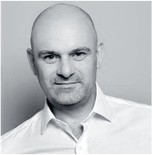FROM THE EDITOR
LGBT+ people are starting the f ght to be heard at the next big Catholic shindig: October’s Synod on Young People
GCN hits the streets just a day before the Pope arrives in Ireland for the World Meeting of Families (WMOF), the theme of which “all are welcome” needs to be changed to “all are welcome, except for some”. Those ‘some’ are Catholic LGBT+ organisations who had their applications for paid-for exhibition stands at the event ignored until the last minute, and then were told that there’s not enough space for them. At exactly the same time as they got the official rejection, other organisations were being off ered stands, free of charge, which suggests there was actually a surfeit of space.

The way the Global Network of Rainbow Catholics (GNRC) and We Are Church (which promotes same-sex marriage) were treated by the organisers of WMOF is indicative of a Church which is reluctant to even broach the complexities of its relationship to gay Catholics, never mind question or revise its teaching that homosexual people are objectively disordered and homosexual acts are intrinsically immoral and contrary to the natural law.
At the same time, the Catholic Church holds that LGBT+ people must be accepted with “respect, compassion, and sensitivity, and every sign of unjust discrimination in their regard should be avoided”.
Making us invisible and ignoring us is not respectful. It lacks compassion and sensitivity, and it is clear and unjust discrimination.
At the beginning of his tenure Pope Francis made some statements that seemed to be somewhat accepting of gay people, but these days the Vatican isn’t saying anything much about homosexuality at all. Instead of jumping up and down as more and more countries introduce same-sex marriage, the hierarchy seems to be taking a diff erent tack. We are being excluded tacitly; they’re giving the message that we’re not good enough by not saying anything about us at all.
But the Church has a responsibility that we can’t let it ignore. After WMOF, the next big Catholic shindig is the Synod on Young People in Brazil from October 3 to 28, at which a gathering of septuagenarian bishops will discuss how the Church must respond to issues facing young people in the modern world. But will they be discussing the eff ects of the Church’s teaching on homosexuality on young people? Or how the Pope calling the growing acceptance of trans people “terrible” might aff ect a young person questioning their gender identity?
On Wednesday August 22, the day WMOF began, a new campaign was launched. Called ‘Equal Future’, it’s an attempt to give voice to LGBT+ young people from six continents and 100 countries in advance of the Synod on Young People. Supported by LGBT+ and ally organisations across the world, it’s a website (www.equalityyouth2018.com) where young LGBTs can go and tell their personal stories, either through writing or video, of how the Catholic Church’s treatment of LGBT people has caused them hurt and damage, and how they feel about it. By identifying which country they come from, their story will be automatically emailed to the delegate representing them at the Synod on Young People.
As we saw in the marriage and eight amendment referendums in Ireland, personal stories are powerful. Right-minded people nd it hard to ignore and empathise with them. It’s hard to imagine the Catholic Church will do the right thing, that they might stop ignoring us and empathise with our stories. But if they ignore thousands of LGBT+ young people’s stories at October’s Synod, it can only say one thing: In the eyes of the Vatican some young people are more equal than others.